- This article is about the clan from the main universe. For the clan from an alternate universe, see Bleeding Hollow clan (alternate universe). For the clan from the Warcraft film universe, see Bleeding Hollow clan (film universe).
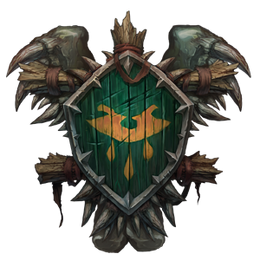 | |
| Main leader |
|
| Formerly |
|
| Race(s) |
|
| Capital |
|
| Formerly | Bleeding Hollow Ruins |
| Language(s) | Orcish |
| Affiliation | Mag'har, Horde, Fel Horde, Illidari |
| Formerly | Old Horde, Horde of Draenor |
| Status | Active |
“The orcs of the Bleeding Hollow Clan were dark allies long ago... and even darker enemies now.”
The Bleeding Hollow clan is a savage and highly superstitious orcish clan originally hailing from the wilds of Tanaan Jungle. One of the largest clans of the Horde before passing into Azeroth,[2] the Bleeding Hollow achieved legendary status for their participation in the First and Second Wars,[3] during the latter of which they were tasked with occupying the dwarven and gnomish lands of Khaz Modan. Under the cunning leadership of their chieftain Kilrogg Deadeye, the Bleeding Hollow were one of the few clans to avoid capture by the Alliance after the Horde's defeat and later rejoined the old clans on Draenor. Those that stayed on Azeroth were captured and put in internment camps before being freed by Thrall. Following Draenor's transformation into Outland, many of the remaining Bleeding Hollow who did not escape back to Azeroth were transformed into fel orcs and entered the service of the Fel Horde, while another portion of the clan have joined the uncorrupted Mag'har orcs at Garadar under the leadership of Kilrogg's son, Warchief Jorin Deadeye.
History[]
Origin[]
Roughly 800 years before the First War, some of the orcs who migrated out of Gorgrond settled in the jungles of Tanaan, later known as Hellfire Peninsula. Though there was no shortage of wild game, Tanaan was tremendously perilous, filled with Primals, poisonous plants and venomous animals. Furthermore, there were dark caves and hollows that seemed to vibrate with sinister, shadowy power. Sometimes the orcs who tapped into this essence found glory, but other times they found madness. Tanaan's orcs adopted a savage, superstitious mindset. Those who kept their sanity called themselves the Bleeding Hollow clan, while those who truly lost themselves to the dark impulses of the wilds were exiled and, over time, formed another, smaller clan known as the Bonechewers. The two clans were never allies, but were also rarely at war. The jungle was a dangerous enough enemy for both.[4]
The alternate universe's Vault of Eyes contains at least 39 skulls of former Bleeding Hollow chieftains, as well as the skull of an unnamed mad chieftain and the ghosts of three former chieftains: Braknoth, Durmak and Vargrak.
Rise of the Horde[]

Chieftain Kilrogg Deadeye leading the Bleeding Hollow clan against the jungle and their enemies inside.
Around 11 years before the First War, the Bleeding Hollow dwelled in the remote corners of Tanaan and faced many threats, from botani and genesaur to ogres and arakkoa. These enemies pushed the clan to the brink of extinction, until Kilrogg Deadeye came to power by gouging out his eye and murdering his sickly father to take control of the ailing clan. Under his leadership, the orcs stormed through the jungles and eradicated their old enemies.[5][6]
Shortly after Blackhand was named Warchief of the Horde, he assigned specific roles to the various clans. The Bleeding Hollow were among the clans assigned to act as scouts, raiders and auxiliary forces that could quickly move from one region of Draenor to another.[7]
Later, Kilrogg and the Bleeding Hollow launched a campaign into Farahlon, a lush island serving as the last bastion of the Primals and one of the few places on Draenor unsullied by fel magic. The forests there were dense, but Kilrogg and his followers were well adapted to fighting in such terrain. As the orcs were not seafarers, the orcish forces relied on ogre shipwrights to build vessels capable of crossing the ocean. Once in Farahlon, orc warlocks leeched life from the Primals and used the stolen power to set the forests ablaze while Kilrogg and his army slaughtered every botani and genesaur they could find.[8]
The First War[]
Right after the opening of the Dark Portal, scouts from the Black Tooth Grin and Bleeding Hollow clans were sent by Blackhand to survey the Black Morass on the other side of the portal.[9]
During the First War against Stormwind, Kilrogg and the Bleeding Hollow led a few raiding parties into the western jungles of Stranglethorn Vale, as the region reminded them of their ancestral home and they had aims of claiming it for themselves. However, the Gurubashi jungle trolls who dwelled in the jungles united to fight back against this new threat and began a guerrilla campaign against the orcs. The fighting between the two groups was unspeakably vicious. While the Bleeding Hollow seemed to outnumber the Gurubashi in every skirmish, they were still at a severe disadvantage against the trolls' knowledge of the region. The Gurubashi were willing to give up vast swathes of jungle to draw the orcs deeper into their territory, only to then launch bloody ambushes from all directions, resulting in horrific losses for the Bleeding Hollow. When Blackhand learned how many orcs were dying in Stranglethorn for no apparent gain, he ordered the Bleeding Hollow to retreat and join the fight against the humans. The Horde would deal with the trolls later.[10]
Later still, Blackhand ordered Kilrogg and Cho'gall of the Twilight's Hammer clan to lead an assault against Stormwind City itself. After the Horde bombarded the city's walls with siege engines through the night, Kilrogg and Cho'gall launched their attack at dawn. Orcs charged the battlements while warlocks engulfed Stormwind's soldiers in fel fire, and it seemed like the city would fall by midday. However, Anduin Lothar led a charge of knights through Elwynn Forest and launched an attack on the orcs' rear lines, forcing the Bleeding Hollow and Twilight's Hammer to break off their aggression and try to push back the knights. When Stormwind's gates opened and soldiers poured of the city, the orcs were forced to flee from the two-pronged assault. It was the biggest disaster the Horde had ever suffered, and Blackhand only restrained himself from executing Kilrogg and Cho'gall because he suspected their clan members would revolt. The Horde instead withdrew to the Redridge Mountains to draw up a new conquest plan.[11]
When Khadgar and Garona were fleeing from Karazhan to Stormwind City toward the end of the war, they traveled through Elwynn Forest and met a patrol of Bleeding Hollow grunts. Garona managed to save Khadgar's lives by pretending he was her slave, which the grunts took as meaning his sexual slave. The patrol was later destroyed by human knights near a ruined watch tower.[12]
The Second War[]
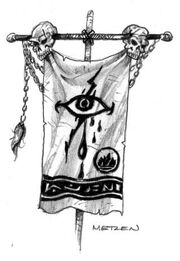
The Bleeding Hollow banner, as seen in Warcraft II.
During the Second War, the Horde swept over the region of Khaz Modan, pushing its dwarven and gnomish inhabitants back to their respective capitals: Ironforge and Gnomeregan. However, as the two cities themselves proved impenetrable — Ironforge due to its fierce dwarven defenders and Gnomeregan due of its iron gate — Warchief Orgrim Doomhammer eventually called off the attacks. Instead, he stationed the Bleeding Hollow outside the gates of Ironforge and Gnomeregan to keep the dwarves and gnomes contained, while orcs from the Blackrock clan began mining the surrounding mountains and commandeering the dwarves' forges in preparation for the invasion of Lordaeron to the north.[13]
Kilrogg and the Bleeding Hollow continued to keep the two races confined in their mountain cities throughout the war, and were also granted the honor of overseeing the oil refinement operations in the region,[2] such as at Grim Batol.[14] When the Alliance of Lordaeron pushed the Horde south into Khaz Modan, Orgrim told Kilrogg and his forces to remain in the occupied lands to delay the Alliance army and prevent it from smashing into the Horde's rearguard. However, shortly afterward the Alliance soldiers poured into Khaz Modan and made short work of the Bleeding Hollow, with paladins leading hunting parties to root out the orcs and drive them from the region. In the process, Ironforge and Gnomeregan were liberated and pledged their forces to the Alliance.[15]
The Bleeding Hollow did not reach Blackrock Spire in time to join Doomhammer's forces during the Horde's last stand against the Alliance, and instead witnessed the aftermath as some of the defeated Horde soldiers stumbled to the Dark Portal. The Alliance army barred Kilrogg's way toward the portal, and he chose to pull his clan back rather than risk a suicidal charge. The orcs quietly disappeared into the wilds north of the gateway to plan their next move. Some time thereafter, Dal'rend and Maim Blackhand, barricaded at Blackrock Spire, reached out to other groups of Horde survivors in an attempt to rally them under the brothers' own banner. Kilrogg ignored them, for he knew that his destiny did not lie with their "false" Horde.[16]
Beyond the Dark Portal[]
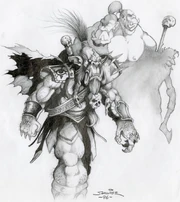
Kilrogg Deadeye leading the remnants of his clan through the Dark Portal.
The Bleeding Hollow continued watching over the Blasted Lands surrounding the Portal for any sign of the Horde's return.[17] They were the only clan left unaccounted for, as the cunning Kilrogg managed to evade the best efforts of the Alliance to capture his clan. Elven scouts were placed on continual patrol within the Black Morass, searching for any sign of the renegade Bleeding Hollow, while an elite cadre of elven rangers under the leadership of Alleria Windrunner attempted to hunt the orcs down.[18][19]
In the year following that of the Horde's fracturing, Ner'zhul reopened the Dark Portal from the Draenor side. Grommash Hellscream led the spear tip of the Horde's invasion force into the Blasted Lands, accompanied by Teron Gorefiend and his death knights. Kilrogg and his clan met with the invasion force and gave them invaluable information about what had happened on Azeroth after the Second War. Gorefiend ordered Kilrogg and his people back to Draenor, for they had fought for survival since the end of the war and they deserved time to rest.[17] The Bleeding Hollow brought some forest trolls and other Azerothian allies with them to Draenor.[18]
The Bleeding Hollow did as Gorefiend commanded and rejoined the 'old clans' on Draenor. To many, the warriors of the Bleeding Hollow were considered mighty heroes for surviving their time in the human lands. Kilrogg met with Ner'zhul, who informed the Bleeding Hollow chieftain of his plan to open portals to new worlds using artifacts from Azeroth.[18]
When Alliance forces later invaded Draenor and claimed the Dark Portal, Ner'zhul began leading most of his forces from Hellfire Citadel to the Black Temple in Shadowmoon Valley. At the edge of the Bone Wastes, the orcs came under bombardment from Alliance gryphon riders, forcing them to retreat to the ruined tomb-city of Auchindoun, which housed little-used passageways leading to Shadowmoon Valley. The gryphon riders launched a new attack, but their leader Kurdran Wildhammer was knocked from his mount, captured by the Horde and taken inside Auchindoun for interrogation by Kilrogg. Danath Trollbane's ground forces soon arrived, and with the help of the gryphon riders and some unexpected aid in the form of a group of arakkoa led by Grizzik, they stormed into Auchindoun and liberated Kurdran. However, Ner'zhul was nowhere to be found. Kilrogg and the remnants of the Bleeding Hollow clan had volunteered to stay behind and occupy the Alliance while the rest of the Horde continued to the Black Temple. Kilrogg was driven to make this sacrifice not simply because of nobility, but because he knew from the ritual he had performed in his youth that Auchindoun was the place where he would die. The Bleeding Hollow fell upon the Alliance forces. In the midst of the bloody battle, Danath confronted and dueled Kilrogg until he managed to plunge his blade through the orc's throat. With their chieftain dead, the rest of the Bleeding Hollow scattered or surrendered, but Kilrogg's sacrifice had given Ner'zhul's forces enough time to safely reach the Black Temple.[20]
When Draenor began to break apart as a result of Ner'zhul's disastrous ritual, many Bleeding Hollow fled back to Azeroth via the Dark Potal just before the gateway was destroyed by Khadgar. Once on Azeroth, the Bleeding Hollow were rounded up by the Alliance and placed in internment camps in Lordaeron alongside the other defeated clans.[21][22] These orcs would later be freed by Thrall and join the modern Horde, however like many clans there is no mention of the Bleeding Hollow orcs having a strong clan identity within the Horde.
The Burning Crusade[]

Zeth'Gor in Hellfire Peninsula, headquarters of the Bleeding Hollow fel orcs in the Fel Horde.
The Bleeding Hollow orcs survived Draenor's transformation into Outland and many were eventually transformed into fel orcs, willingly or otherwise, coming into the service of the Fel Horde and the Illidari. The stronghold of Zeth'Gor served as the cursed abode of the Bleeding Hollow, though both Alliance and Horde forces tasked adventurers with putting the bastion to the torch. Wing Commander Dabir'ee told Alliance heroes to place smoke beacons at several towers in the town to direct the fire of the gryphon riders, while Captain Darkhowl simply asked Horde heroes to use the torches of slain Bleeding Hollow peons to set fire to several buildings.[23] The Bleeding Hollow warlord Morkh was then slain by Alliance adventurers[24] while Horde champions ensorcelled a floating eye of the Bleeding Hollow witch Grillok "Darkeye"[1] before slaying the orc himself and bringing his eyepatch to Zezzak.[25] The head of Worg Master Kruush, who led the worg riders of the Bleeding Hollow clan, was also brought to Darkhowl.[26] A number of Bleeding Hollow troops can also be found in the Hellfire Ramparts of Hellfire Citadel.

The Bleeding Hollow Ruins, now occupied by ogres.
Many Bleeding Hollow collected the insignias of fallen Honor Hold soldiers and created cursed talismans from them. The forces of Honor Hold suspected that the orcs' dark magic transformed the insignias into evil charms to be used against the Alliance.[27] Corporal Ironridge asked Alliance adventurers to acquire several of these cursed talismans so that they could be disposed of, and so that the soldiers who once owned them could be honored for their sacrifices.[28]
Apothecary Zelana tasked Horde adventures with delivering a sample of Bleeding Hollow blood to her colleague, Apothecary Albreck, for study.[29] Albreck then asked the adventurers to gather more blood from the forces at Zeth'Gor, boil the liquid in the orcs' cursed cauldron and bring the final results back to him.[30] Using the findings from these efforts, Albreck was able to put together a report to his colleague, Apothecary Antonivich, hypothesising that the fel orcs' corruption stemmed from a pit lord similar in power to Mannoroth, the demon who was responsible for the original blood-curse.[31]
Another group of Bleeding Hollow, unaffected by corruption, lived in a settlement on the border between Nagrand and southwestern Terokkar Forest under the leadership of Kilrogg's son Jorin Deadeye. When the village suffered a nighttime attack by Boulderfist ogres, these Bleeding Hollow were forced to flee to Garadar, home village of the uncorrupted Mag'har orcs in Nagrand. To Jorin's great frustration, the Mag'har leader, Garrosh Hellscream, refused to lend his assistance. Instead, the scout Kilrath was dispatched to the ruins of the village and Horde adventurers were sent to assist him.[32] The adventurers learned from Unkor the Ruthless, the ogre leader in the ruins, that the Boulderfist were being exterminated and forced out of Nagrand by a new ogre clan known as the Warmaul.[33] This led to a series of events in which the Horde adventurer successfully assisted the Boulderfist leader — Lantresor of the Blade — with creating conflict between the Warmaul and Kil'sorrow clans, though Garrosh was still unmoved.[34]
Dragonflight[]

The Bleeding Hollow at the Kosh'harg
The Bleeding Hollow clan was one of the orcish clans in attendance at the first Kosh'harg on Azeroth at Razor Hill, represented by the chieftain, Jorin Deadeye and a number of their members. Meanwhile Ariok of the Blackrock clan stated his intent to question if the Bleeding Hollow had a cure for the blood magic ritual that turned him into a dire orc during the incursion into Tanaan Jungle, during the festival. Though it is unknown if such a conversation took place.
What is known is that as the clan leaders gathered inside of the Razor Hill Barracks to pitch their clan to prospective orcish recruits; Jorin remarked on how his is known for performing rituals that many would consider dark, that they didn't shy away from such tools, and that they know what fate has in store them and will do what they must to survive. Upon the champion requesting to join the Bleeding Hollow, Jorin stated that he had underestimated them.[35] He subsequently instructed them with hunting, tracking, and killing Gor'krosh, the Long Knives, without their armor, in order to test their skills in battle.[36] Following their success, Eitrigg accepted the ![]() ["Long Knife"] as a trophy on behalf of his clan.[37]
["Long Knife"] as a trophy on behalf of his clan.[37]
During the feast celebrating orc champions for completing the om'gora, Jorin sat with clan, where he revealed to them his intention to unify the clan and move them to Azeroth, as he recognized the future of the orcs being on Azeroth.[38]
People and culture[]

A young Kilrogg preparing to cut out his eye.

Bleeding Hollow banner in Razor Hill during the first Azerothian Kosh'harg.
On Draenor, the highly superstitious Bleeding Hollow were much different than other clans and practiced dark rituals in the remote corners of Tanaan Jungle.[5] As they were an insular clan living in one of the most hostile parts of Draenor, they had little contact with the draenei.[39] Generations of surviving in a jungle beset by the remnants of the Evergrowth instilled a savage instinct into the orcs' warfare[10] and the Bleeding Hollow embodied the unrelenting savagery required for many long years of successful orcish warfare.[2]
Members of the Bleeding Hollow imbued themselves with berserk fury, slathering their weapons in hallucinogenic venom and stalking prey from the treetops, branding their victims' final moments with visions of pure horror.[40] The clan was infamous for their use of blood magic, described by Shadow Hunter Denjai as "like voodoo but it hurt more". The orcs carved blood sigils into their own flesh with curved ceremonial blades, created potions from the blood of their strongest warriors[39][41] and used savage blood magic to transform their warriors into hulking berserkers.[42]
The Bleeding Hollow found truth in the surety of their deaths.[6] Upon ascension to ruler of the clan, each Bleeding Hollow chieftain undertook a shamanic vision quest in which they sacrificed their own eye to receive a vision of their own death,[43] but sometimes the vision would show much more.[6] This practice allowed the chieftains to live their life without fear, for they knew the exact day of their demise.[5] The clan is named after the secret chamber below Tanaan where this ritual was traditionally performed.[44] After the ritual, all chieftains would place their eye under the protection of the clan's ghosts in the Vault of Eyes.[45]
Members[]
| Name | Role | Status | Location |
|---|---|---|---|
| Former chieftain, murdered by his son. | Deceased | Unknown | |
| Former chieftain, killed in a duel by Danath Trollbane. | Deceased | Died in Auchindoun | |
| Son of Kilrogg, Warchief of the Bleeding Hollow clan. | Alive | Garadar, Nagrand | |
| Darkest witch of Zeth'Gor | Killable | Zeth'Gor, Hellfire Peninsula | |
| Scout and Warsong Offensive tactical officer. | Alive | Bleeding Hollow Ruins, Terokkar Forest; Wintergrasp | |
| Leader of the worg riders at Zeth'Gor. | Killable | Zeth'Gor, Hellfire Peninsula | |
| Scout | Alive | Orgrimmar | |
| Warlord of Zeth'Gor | Killable | Zeth'Gor, Hellfire Peninsula | |
| Skilled warrior who assisted Teron Gorefiend to steal the Book of Medivh. | Unknown | Unknown | |
| Champion and Second of the Council of the Black Harvest. | Alive | Various Locations | |
| Member of the clan | Alive | Drag, Orgrimmar |
Unnamed[]
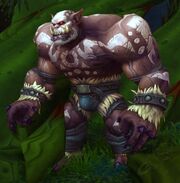
Leadership[]
-
Deadeye[]
-
Fel Horde[]
Items[]
 [Bleeding Hollow Warhammer]
[Bleeding Hollow Warhammer] [Bleeding Hollow Blood Sample] /
[Bleeding Hollow Blood Sample] /  [Bleeding Hollow Blood]
[Bleeding Hollow Blood] [Bleeding Hollow Torch] /
[Bleeding Hollow Torch] /  [Burning Bleeding Hollow Torch]
[Burning Bleeding Hollow Torch] [Bleeding Hollow Supply Crate]
[Bleeding Hollow Supply Crate]
In Warcraft II[]

Banner of the Bleeding Hollow clan in Warcraft II: Beyond the Dark Portal.
Chieftain: Kilrogg Deadeye
Clan Colors: Green
Background: The Bleeding Hollow clan was one of the largest in the Horde before passing into Azeroth. Led by the aged Kilrogg, the Bleeding Hollow embodies the unrelenting savagery required for many long years of successful Orcish warfare. In accordance with their unequaled performance in battle, they have been given the honor of safeguarding the refinement operations in the occupied lands of Khaz Modan. Allegiant to the Blackrock clan, these veteran warriors place the needs of the Horde above all else.[2]
Domain: Ironforge, Khaz Modan
In Beyond the Dark Portal[]
Leader: Kilroggg Deadeye[sic]
Color: Orange
This clan has achieved legendary status for battling the forces of Azeroth throughout both the First and Second Wars. Kilroggg[sic] was able to avoid capture by the Alliance after the defeat of the Horde in the Second War, and with the help of Ner'zhul was able to lead his clan back to the safety of Draenor. The Bleeding Hollow now serves Ner'zhul and will stop at nothing to bring his dark plans to fruition.[3]
Trivia[]
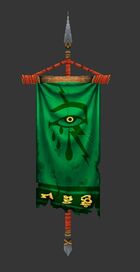
The old banner of the clan in color.
- In the canceled Warcraft Adventures, the Bleeding Hollow clan was shown to be free and to still be under Kilrogg's leadership.
- Rise of the Horde lists the Bleeding Hollow as having remained in Draenor,[46] when they were actually one of the first orcish clans on Azeroth, which is reflected in The Last Guardian, Tides of Darkness and Chronicle Volume 2.
- The Bleeding Hollow clan color was originally green in Warcraft II: Tides of Darkness, but was changed to orange in Warcraft II: Beyond the Dark Portal. The World of Warcraft version of the clan banner returns to the original green color, while the crest of the alternate Bleeding Hollow in Warlords of Draenor features an orange sigil on a dark green background.
- The Bleeding Hollow were originally depicted as at least partially living in or near Terokkar Forest, as indicated by Fortress Auchindoun and the Bleeding Hollow Ruins. Warlords of Draenor and Chronicle Volume 2 instead established that they were native to Tanaan Jungle, later known as Hellfire Peninsula, a notion supported by the presence of the Bleeding Hollow stronghold of Zeth'Gor in eastern Hellfire Peninsula. It can be speculated that the clan left Tanaan when it began to transform into Hellfire and instead moved to the only forested area left on Draenor.
- The clan's ability to survive alone in the wilds of Azeroth until the reopening of the Dark Portal, despite being tracked by Alleria Windrunner's rangers, is likely connected to their origins as jungle fighters. Warcraft II: Beyond the Dark Portal indicated that a portion of the clan remained on Azeroth and later rejoined the forces of the Horde of Draenor to search for the Book of Medivh.[47][48]
Speculation[]
This article or section includes speculation, observations or opinions possibly supported by lore or by Blizzard officials. It should not be taken as representing official lore.
|
The naming of Zeth'Gol, Zeth'kur and its alternate version, and Zeth'Gor seems to imply that all major Bleeding Hollow clan settlements have this prefix.
See also[]
References[]
- ^ a b
 [10-30] The Eyes of Grillok
[10-30] The Eyes of Grillok
- ^ a b c d Warcraft II: Tides of Darkness manual, Clans of the Horde, Bleeding Hollow Clan
- ^ a b Warcraft II: Beyond the Dark Portal manual, Clans of Draenor, Bleeding Hollow Clan
- ^ World of Warcraft: Chronicle Volume 2, pg. 39 - 41 (map)
- ^ a b c World of Warcraft: Chronicle Volume 2, pg. 66
- ^ a b c Lords of War Part Four — Kilrogg
- ^ World of Warcraft: Chronicle Volume 2, pg. 82
- ^ World of Warcraft: Chronicle Volume 2, pg. 97
- ^ World of Warcraft: Chronicle Volume 2, pg. 116
- ^ a b World of Warcraft: Chronicle Volume 2, pg. 125
- ^ World of Warcraft: Chronicle Volume 2, pg. 132
- ^ The Last Guardian, chapter 14
- ^ World of Warcraft: Chronicle Volume 2, pg. 150 - 151
- ^ Grim Batol
- ^ World of Warcraft: Chronicle Volume 2, pg. 171
- ^ World of Warcraft: Chronicle Volume 2, pg. 175
- ^ a b World of Warcraft: Chronicle Volume 2, pg. 185
- ^ a b c Warcraft II: Beyond the Dark Portal manual, The Aftermath of the Second War
- ^ Warcraft II: Beyond the Dark Portal manual, Legends of the Land, Alleria
- ^ World of Warcraft: Chronicle Volume 2, pg. 192
- ^ Warcraft III: Reign of Chaos manual, History of the Horde, Ner'zhul and the Shadow Clans
- ^ The Battle of Grim Batol
- ^
 [10-30] Zeth'Gor Must Burn!
[10-30] Zeth'Gor Must Burn!
- ^
 [10-30] Warlord of the Bleeding Hollow
[10-30] Warlord of the Bleeding Hollow
- ^
 [10-30G] Grillok "Darkeye"
[10-30G] Grillok "Darkeye"
- ^
 [10-30] WANTED: Worg Master Kruush
[10-30] WANTED: Worg Master Kruush
- ^
 [10-30] Ill Omens
[10-30] Ill Omens
- ^
 [10-30] Cursed Talismans
[10-30] Cursed Talismans
- ^
 [10-30] Spinebreaker Post
[10-30] Spinebreaker Post
- ^
 [10-30] Boiling Blood
[10-30] Boiling Blood
- ^
 [Albreck's Findings]
[Albreck's Findings]
- ^
 [15-30] The Impotent Leader
[15-30] The Impotent Leader
- ^
 [15-30] Success!
[15-30] Success!
- ^
 [15-30] Message to Garadar
[15-30] Message to Garadar
- ^


 [50-70] The Blessing of the Clan, Jorin's dialogue.
[50-70] The Blessing of the Clan, Jorin's dialogue.
- ^


 [50-70] The Long Knives
[50-70] The Long Knives
- ^


 [50-70] Cornering Gor'krosh
[50-70] Cornering Gor'krosh
- ^


 [50-70] Honor and Glory
[50-70] Honor and Glory
- ^ a b
 [40 Daily] Bloodied Blades of Zeth'Gol
[40 Daily] Bloodied Blades of Zeth'Gol
- ^ Warlords of Draenor. Retrieved on 2017-04-28.
- ^
 [40 Daily] Bloodied Blades of Zeth'Gol
[40 Daily] Bloodied Blades of Zeth'Gol
- ^
 [10-40] Altar Altercation
[10-40] Altar Altercation
- ^
 [Calcified Eye In a Jar]
[Calcified Eye In a Jar]
- ^ The Characters of Warcraft/Kilrogg Deadeye
- ^
 [40] The Eye of Kilrogg
[40] The Eye of Kilrogg
- ^ Rise of the Horde, pg. 342
- ^ Dragons of Blackrock Spire
- ^ New Stormwind
| |||||||||||||||||||||||||||||||||||||||||||||||||||||||||||||||||||||||||||||||||||||||||||||||||||||||||||||||||||||||||||||||||||||||

